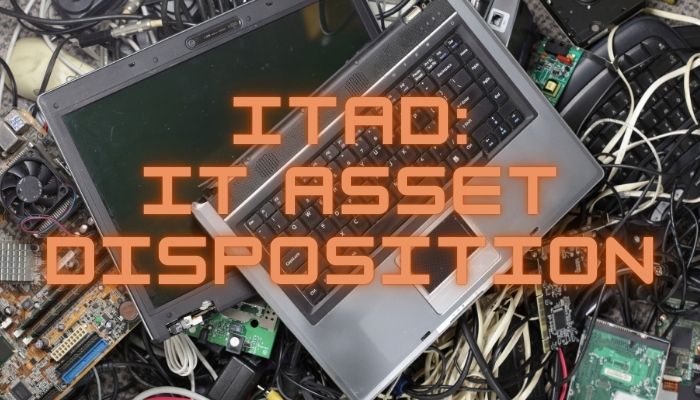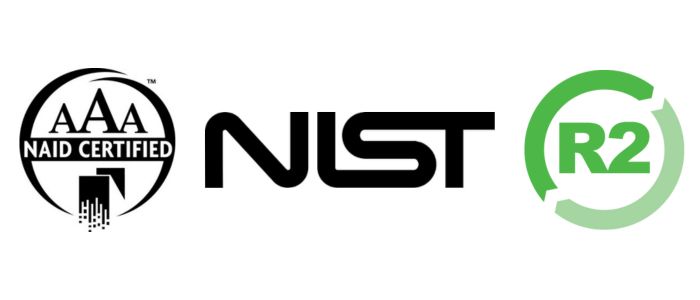ITAD: IT Asset Disposition
ITAD stands for IT Asset Disposition. It’s a field focused on the safe disposition of decommissioned IT assets. In our world today, it’s no stretch to say that businesses have to rely on their IT assets (computers and other electronics), and as these businesses grow and change, so does their required IT equipment. Even if the organization’s required IT assets stay the same, the equipment itself won’t last forever. Generally companies go through a tech refresh every 2-5 years depending on the equipment they use.
ITAD practices ensure that this unwanted or bad equipment is disposed of in a manner that’s safe for the environment, the organization, and encourages sustainability. In this article, we’re going to tell you exactly what ITAD is, why it’s important, how it can benefit and provide income for your company.
What is ITAD?
ITAD is the secure and strategic process of disposing of used or retired IT equipment. It is the process that organizations use to dispose of and recycle outdated or unwanted IT assets in a safe and responsible manner. IT asset disposition can also be called IT asset recycling.
As the old saying goes, the only thing constant in life is change. This statement is highly relevant to IT equipment because it is the most susceptible to change. For example, equipment like smartphones are outdated every year. Even if the equipment doesn’t become outdated quickly or is still usable after being outdated, the organization’s needs and required IT equipment are bound to change sooner or later. This is where an ITAD company comes in.
ITAD professionals like SmartphonesPLUS help your organization get rid of that equipment in a safe manner. Not only that, they also help your company figure out what equipment can be reused and recycled. Reusable or recyclable equipment can be sold to mitigate costs, and companies like SmartphonesPLUS are always ready to buy your used IT equipment at good prices.
Data security is another area ITAD professionals take very seriously. Making sure disposed items don’t contain any data.
Importance of Responsible ITAD
Environmental Safety
Every year, humanity produces more than 50 million tons of electronic waste (e-waste). E-waste quickly becomes toxic waste because most electronics contain toxic materials like lead, mercury, etc. These toxins can find their way into the soil and water, stripping the soil of its nutrients and making our water sources poisonous. Safe ITAD practices prevent this from happening.
Data Safety
As mentioned earlier in the article, ITAD professionals specialize in data security. Hence, they make sure every piece of equipment is wiped clean before being properly disposed of. Failing to observe this practice can have serious consequences for your organization. For one, sensitive information that wasn’t wiped from old devices could lead to a data breach. Make sure the company you choose follows data erasure standards such as NIST-800-88, NAID, or R2 standards. Don’t be the next company that is in the news!
 The Circular Economy
The Circular Economy
ITAD plays a big role in the circular economy. What is the circular economy, you might ask? Well, it’s a model that deviates from the tradition or linear economy in which goods simply lose their value or use and are discarded when they’ve served their purpose. The make-use-dispose model. In the circular economy, there is a focus on reusing and recycling. So once a product has served its purpose, it is resold, recycled, and reused. The circular economy extends the lifespan of products and extracts their full value. The circular economy follows a circular pattern that continually reduces, reuses, and recycles scarce resources back into the supply chain, keeping existing materials in circulation for as long as possible to conserve raw materials.
Benefits of ITAD
-
Data Protection
Proper ITAD practices ensure that your company’s data is secured even when equipment is no longer useful or disposed of. This prevents your organization’s data from falling into unauthorized hands.
-
Environmental Safety
Proper ITAD practices ensure that your company doesn’t contribute to the e-waste problem and help keep the environment in better condition.
-
Cost Effective
By selling or recycling eligible IT equipment, your organization can recoup some of the money spent to get the items. Also, by redeploying reusable assets, your organization can save money.
Key Stages of a Secure ITAD Process
A secure ITAD process typically involves several key stages to ensure the responsible and compliant disposal of IT assets. Here’s a general breakdown:
Data Wiping and Sanitization: This crucial step prioritizes data security. IT professionals use specialized erasure software to overwrite data on storage devices, rendering it unrecoverable. This protects sensitive information from falling into the wrong hands during the disposal process.
Asset Sorting, Categorization, and Evaluation: Once data is sanitized, the IT assets are sorted and categorized based on type, condition, and functionality. This helps determine the most appropriate disposition method for each item.
Resale or Repurposing: Still-functional equipment with value can be resold through certified vendors or redeployed within the organization.
Recycling: E-waste with no resale potential is responsibly recycled by reputable e-waste processors. Certified recyclers ensure environmentally sound practices to extract valuable materials and minimize environmental impact.
Destruction: In some cases, certain IT assets might require physical destruction due to data security concerns or the presence of hazardous materials. ITAD providers can handle this process according to specific regulations.
Secure Transportation and Certified E-waste Recycling: Reputable ITAD vendors ensure secure transportation of the categorized assets to their recycling facilities. These facilities are certified to handle e-waste responsibly, with proper dismantling, material separation, and recycling procedures in place.
 Conclusion
Conclusion
Effective IT asset disposition (ITAD) practices are essential for organizations looking to manage their electronic assets responsibly, securely, and sustainably. By implementing proper ITAD strategies, businesses can not only protect themselves from risks associated with data breaches and environmental harm but also save and even make money.


 The Circular Economy
The Circular Economy Conclusion
Conclusion




